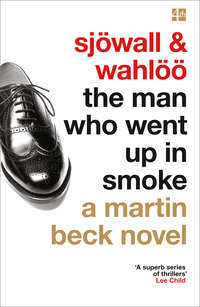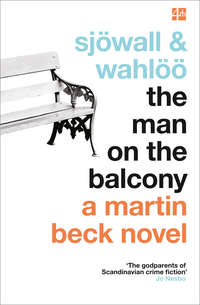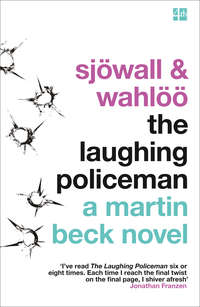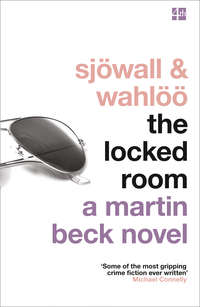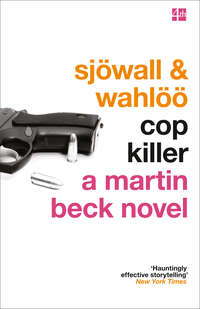
Полная версия
The Abominable Man
‘Nix verstehen,’ the doctor said.
Rönn put on his glasses and examined the plastic name badge on the doctor's white coat. Sure enough, there was his name.
DR ÜZK ÜKÖCÖTÜPZE.
‘Oh,’ he said to himself.
Put away his glasses and waited.
6
The room was fifteen feet long, ten feet wide, and almost twelve feet high. The colours were very drab – ceiling a dirty white and the plastered walls an indefinite greyish yellow. Grey-white marble tiles on the floor. Light grey window-frames and door. In front of the window hung heavy pale-yellow damask curtains and, behind them, thin white cotton nets. The iron bed was white, likewise the sheets and pillowcase. The night table was grey and the wooden chair light brown. The paint on the furniture was worn, and on the rough walls it was crackled with age. The plaster on the ceiling was flaking and in several places there were light brown spots where moisture had seeped through. Everything was old but very clean. On the table was a nickel silver vase with seven pale red roses. Plus a pair of glasses and a glasses case, a transparent plastic beaker containing two small white tablets, a little white transistor radio, a half-eaten apple, and a tumbler half full of some bright yellow liquid. On the shelf below lay a pile of magazines, four letters, a tablet of lined paper, a shiny Waterman pen with ballpoint cartridges in four different colours, and some loose change – to be exact, eight ten-öre pieces, two twenty-five-öre pieces, and six one-krona coins. The table had two drawers. In the upper one were three used handkerchiefs, a bar of soap in a plastic box, toothpaste, toothbrush, a small bottle of after-shave, a box of cough drops, and a leather case with a nail clipper, file and scissors. The other contained a wallet, an electric razor, a small folder of postage stamps, two pipes, a tobacco pouch and a blank picture postcard of the Stockholm city hall. There were some clothes hanging over the back of the straight chair – a grey cotton coat, trousers of the same colour and material, and a knee-length white shirt. Underwear and socks lay on the seat, and next to the bed stood a pair of slippers. A beige bathrobe hung on the clothes hook by the door.
There was only one completely dissident colour in the room. And that was a shocking red.
The dead man lay partly on his side between the bed and the window. The throat had been cut with such force that the head had been thrown back at an angle of almost ninety degrees and lay with its left cheek against the floor. The tongue had forced its way out through the gaping incision and the victim's broken false teeth stuck out between the mutilated lips.
As he fell backwards a thick stream of blood had pumped out through the carotid artery. This explained the crimson streak across the bed and the splashes of blood on the flower vase and night table.
On the other hand it was the wound in the midriff that had soaked the victim's shirt and provided the enormous pool of blood around the body. A superficial inspection of this wound indicated that someone, with a single blow, had cut through the liver, bile ducts, stomach, spleen and pancreas. Not to mention the aorta.
Virtually all the blood in the body had welled out in the course of a few seconds. The skin was bluish white and seemed almost transparent, where, that is, it could be seen at all, for example on the forehead and parts of the shins and feet.
The lesion on the torso was about ten inches long and wide open; the lacerated organs had pressed out between the sliced edges of the peritoneum.
The man had virtually been cut in two.
Even for people whose job it was to linger at the scenes of macabre and bloody crimes, this was strong stuff.
But Martin Beck's expression hadn't changed since he entered the room. To an outside observer it would have seemed almost as if everything were part of the routine – going to the Peace with his daughter, eating, drinking, getting undressed, pottering with a ship model, going to bed with a book. And then suddenly rushing off to inspect a slaughtered chief inspector of police. The worst part was that he felt that way himself. He never allowed himself to be taken aback, except by his own emotional coolness.
It was now three ten in the morning and he sat on his haunches beside the bed and surveyed the body, coldly and appraisingly.
‘Yes, it's Nyman,’ he said.
‘Yes, I suppose it is.’
Rönn stood poking among the objects on the table. All at once he yawned and put his hand guiltily to his mouth.
Martin Beck threw him a quick glance.
‘Have you got some sort of timetable?’
‘Yes,’ Rönn said.
He pulled out a small notebook where he'd made some industrious jottings in a tiny, stingy hand. Put on his glasses and rattled it off in a monotone.
‘An assistant nurse opened those doors at ten minutes after two. Hadn't heard or seen anything unusual. Making a routine check on the patients. Nyman was dead then. She dialled 90-000 at two eleven. The officers in the radio car got the alarm at two twelve. They were at Odenplan and made it here in between three and four minutes. They reported to Criminal at two seventeen. I got here at two twenty-two. Called you at two twenty-nine. You got here at sixteen minutes to three.’
Rönn looked at his watch.
‘It's now eight minutes to three. When I arrived he'd been dead at the most half an hour.’
‘Is that what the doctor said?’
‘No, that's my own conclusion, so to speak. The warmth of the body, coagulation –’
He stopped, as if it had been presumptuous to mention his own observations.
Martin Beck rubbed the bridge of his nose thoughtfully with the thumb and forefinger of his right hand.
‘So then everything happened very fast,’ he said.
Rönn didn't answer. He seemed to be thinking about something else.
‘Well,’ he said after a while, ‘you understand why it was I called you. Not because –’
He stopped, seeming somehow distracted.
‘Not because?’
‘Not because Nyman was a chief inspector, but because … well, because of this.’
Rönn gestured vaguely towards the body.
‘He was butchered.’
He paused for a second and then came up with a new conclusion.
‘I mean, whoever did this must be raving mad.’
Martin Beck nodded.
‘Yes,’ he said. ‘It looks that way.’
7
Martin Beck was beginning to feel ill at ease. The sensation was vague and hard to trace, somewhat like the sneaking fatigue when you're falling asleep over a book and go on reading without turning any pages.
He'd have to make an effort to gather his wits and get a grip on these slippery apprehensions.
Closely related to this lurking sensation of impotence, there was another feeling he couldn't seem to get rid of.
A sense of danger.
That something was about to happen. Something that had to be warded off at any price. But he didn't know what, and still less how.
He'd had such feelings before, if only at long intervals. His colleagues tended to laugh off this phenomenon and call it intuition.
Police work is built on realism, routine, stubbornness and system. It's true that a lot of difficult cases are cleared up by coincidence, but it's equally true that coincidence is an elastic concept that mustn't be confused with luck or accident. In a criminal investigation, it's a question of weaving the net of coincidence as fine as possible. And experience and industry play a larger role there than brilliant inspiration. A good memory and ordinary common sense are more valuable qualities than intellectual brilliance.
Intuition has no place in practical police work.
Intuition is not even a quality, any more than astrology and phrenology are sciences.
And still it was there, however reluctant he was to admit it, and there had been times when it seemed to have put him on the right track.
And yet his ambivalence might also depend on simpler, more tangible and immediate things.
On Rönn, for example.
Martin Beck expected a great deal of the people he worked with. The blame for that fell on Lennart Kollberg, for many years his right-hand man, first when he was a city detective in Stockholm and then later at the old National Criminal Division in Västberga. Kollberg had always been his surest complement, the man who played the best shots, asked the right leading questions and gave the proper cues.
But Kollberg wasn't available. He was at home asleep, presumably, and there was no acceptable reason for waking him. It would be against the rules, and an insult to Rönn what's more.
Martin Beck expected Rönn to do something or at least say something that showed he too sensed the danger. That he would come up with some assertion or supposition that Martin Beck could refute or pursue.
But Rönn said nothing.
Instead he did his job calmly and capably. The investigation was for the moment his, and he was doing everything that could reasonably be expected.
The area outside the window had been cordoned off with ropes and sawhorses, patrol cars had been driven up and headlights lit. Spotlights swept the terrain and small white patches of light from police flashlights wandered jerkily across the ground like frightened sand crabs across a beach in unorganized flight from approaching intruders.
Rönn had gone through what there was on and in the night table without finding anything but ordinary personal belongings and a few trivial letters of the insensitively hearty type that healthy people write to individuals who are suspected of being seriously ill. Civilian personnel from the Fifth Precinct had gone through the adjoining rooms and wards without finding anything of note.
If Martin Beck wanted to know anything in particular, he would have to ask, and furthermore would have to formulate his question clearly, in phrases that could not be misunderstood.
The truth of the matter was simply that they worked together badly. Both of them had discovered this years before, and they therefore generally avoided situations where they had only one another to fall back on.
Martin Beck's opinion of Rönn was none too high, a circumstance the latter was well aware of and which gave him an inferiority complex. Martin Beck, for his part, recognized as his own failing a difficulty in establishing contact and thus became inhibited himself.
Rönn had produced the beloved old murder kit, secured a number of fingerprints, and had plastic covers placed over several pieces of evidence in the room and on the ground outside, thereby ensuring that details that might prove valuable later on would not be effaced by natural causes or destroyed by carelessness. These pieces of evidence were mostly footprints.
Martin Beck had a cold, as usual at this time of year. He snuffled and blew his nose and coughed and hacked and Rönn didn't react. He did not, as a matter of fact, even say ‘Bless you.’ This small civility was apparently not a part of his upbringing, nor of his vocabulary. And if he thought anything, he kept it to himself.
There was no tacit communication between them and Martin Beck felt himself called upon to break the silence.
‘Doesn't this whole ward seem a little old-fashioned?’ he asked.
‘Yes,’ Rönn said. ‘It's supposed to be vacated the day after tomorrow and modernized or turned into something else. The patients are going to be moved to new wards in the central building.’
Martin Beck's thoughts moved promptly off in new directions.
‘I wonder what he used,’ he said a while later, mostly to himself. ‘Maybe a machete or a samurai sword.’
‘Neither one,’ said Rönn, who had just come into the room. ‘We've found the weapon. It's lying outside, about twelve feet from the window.’
They went outside and looked.
In the cold white light of a spot lay a broad-bladed cutting tool.
‘A bayonet,’ said Martin Beck.
‘Yes. Exactly. For a Mauser carbine.’
The six-millimetre carbine had been a common military weapon, used mostly by the artillery and cavalry. Martin Beck had one himself when he did his national service. The weapon had probably gone out of use by now and been struck from the quartermaster's rolls.
The blade was entirely covered with clotted blood.
‘Can you get fingerprints from that grooved handle?’
Rönn shrugged his shoulders.
Every word had to be dragged from him, if not by force then by verbal pressure.
‘You're letting it lie there until it gets light?’
‘Yes,’ Rönn said. ‘Seems like a good idea.’
‘I'd very much like to talk to Nyman's family as soon as possible. Do you think we could get his wife out of bed at this hour?’
‘Yes, I suppose so,’ said Rönn without conviction.
‘We have to start somewhere. Are you coming along?’ Rönn mumbled something.
‘What'd you say?’ said Martin Beck and blew his nose. ‘Got to get a photographer out here,’ Rönn said. ‘Yeah.’ But he didn't sound at all as if he cared.
8
Rönn walked out to the car and got into the driver's seat to wait for Martin Beck, who'd taken upon himself the unpleasant task of calling the widow.
‘How much did you tell her?’ he asked when Martin Beck had climbed in beside him.
‘Only that he's dead. He was apparently seriously ill, so maybe it didn't come as such a surprise. But of course now she's wondering what we've got to do with it.’
‘How did she sound? Shocked?’
‘Yes, of course. She was going to jump in a taxi and come straight over to the hospital. There's a doctor talking to her now. I hope he manages to convince her to wait at home.’
‘Yes. If she saw him now she'd really get a shock. It's bad enough having to tell her about it.’
Rönn drove north on Dalagatan towards Odengatan. Outside the Eastman Institute stood a black Volkswagen. Rönn nodded towards it.
‘Not bad enough he parks in a no-parking zone, he's halfway up on the pavement too. Lucky for him we're not from Traffic.’
‘On top of which he must have been drunk to park like that,’ said Martin Beck.
‘Or she,’ Rönn said. ‘It must be a woman. Women and cars …’
‘Typical stereotyped thinking,’ said Martin Beck. ‘If my daughter could hear you now you'd be in for a real lecture.’
The car swung right on Odengatan and drove on past Gustav Vasa Church and Odenplan. At the taxi station there were two cabs with their FREE signs lit, and at the traffic lights outside the city library there was a yellow street-cleaning machine with a blinking orange light on its roof, waiting for the light to turn green.
Martin Beck and Rönn drove on in silence. They turned on to Sveavägen and passed the street-sweeper as it rumbled around the corner. At the School of Economics they took a left on to Kungstensgatan.
‘Damn it to hell,’ said Martin Beck suddenly with emphasis.
‘Yeah,’ said Rönn.
Then it was quiet again in the car. When they'd crossed Birger Jarlsgatan, Rönn slowed down and started hunting for the number. A door to a block of flats across from the Citizens School opened and a young man stuck out his head and looked in their direction. He held the door open while they parked the car and crossed the street.
When they reached the doorway they saw that the boy was younger than he'd looked from a distance. He was almost as tall as Martin Beck, but looked to be fifteen years old at the most.
‘My name's Stefan,’ he said. ‘Mother's waiting upstairs.’
They followed him up the stairs to the second floor, where a door stood ajar. The boy showed them through the front hall and into the living room.
‘I'll get Mother,’ he mumbled and disappeared into the hall.
Martin Beck and Rönn remained standing in the middle of the room and looked around. It was very neat. One side was taken up by a suite of furniture that seemed to date from the 1940s and consisted of a sofa, three matching easy chairs in varnished blond wood and flowered cretonne upholstery, and an oval table of the same light wood. A white lace cloth lay on the table, and in the middle of the cloth was a large crystal vase of red tulips. The two windows looked out on the street, and behind the white lace curtains stood rows of well-tended potted plants. The wall at one end of the room was covered by a bookcase in gleaming mahogany, half filled with leather-bound books, half with souvenirs and knick-knacks. Small polished tables with pieces of silver and crystal stood here and there against the walls. A black piano with the lid closed over the keyboard completed the list of furniture. Framed portraits of the family stood lined up on the piano. Several still lifes and landscapes in wide ornate gold frames hung on the walls. A crystal chandelier burned in the middle of the room, and a wine-red Oriental rug lay beneath their feet.
Martin Beck took in the various details of the room as he listened to the footsteps approaching in the hall. Rönn had walked up to the bookcase and was suspiciously eyeing a brass reindeer-bell, one side of which was adorned with a brightly coloured picture of a mountain birch, a reindeer and a Lapp, plus the word ARJEPLOG in ornate red letters.
Mrs Nyman came into the room with her son. She was wearing a black wool dress, black shoes and stockings, and held a small white handkerchief clenched in one hand. She had been crying.
Martin Beck and Rönn introduced themselves. She didn't look as if she'd ever heard of them.
‘But please sit down,’ she said, and took a seat in one of the flowered chairs.
When the two policemen had seated themselves she looked at them with despair in her eyes.
‘What is it that's actually happened?’ she asked in a voice that was much too shrill.
Rönn took out his handkerchief and began to polish his florid nose, thoroughly and at length. But Martin Beck hadn't expected any help from that quarter.
‘If you have anything to calm your nerves, Mrs Nyman – pills, I mean – I think it would be wise to take a couple now,’ he said.
The boy, who had taken a seat on the piano stool, stood up.
‘Papa has … There's a bottle of Restenil in the cabinet in the bathroom,’ he said. ‘Shall I get it?’
Martin Beck nodded and the boy went out to the bathroom and came back with the tablets and a glass of water. Martin Beck looked at the label, shook out two tablets into the lid of the bottle and handed them to Mrs Nyman, who obediently swallowed them with a gulp of water.
‘Thank you,’ she said. ‘Now please tell me what it is you want. Stig is dead, and neither you nor I can do anything about that.’
She pressed the handkerchief to her mouth, and her voice was stifled when she spoke.
‘Why wasn't I allowed to go to him? He's my husband after all. What have they done to him there at the hospital? That doctor … he sounded so odd …’
Her son went over and sat on the arm of her chair. He put his arm around her shoulders.
Martin Beck twisted in his chair so that he sat directly facing her, then he threw a glance at Rönn, sitting silently on the sofa.
‘Mrs Nyman,’ he said, ‘your husband did not die of his illness. Someone entered his room and killed him.’
The woman stared at him and he could see in her eyes that several seconds passed before she understood the significance of what he'd said. She lowered the hand with the handkerchief and pressed it to her breast. She was very pale.
‘Killed? Someone killed him? I don't understand …’
The son had gone white around the nostrils and his grip around his mother's shoulders tightened.
‘Who?’ he said.
‘We don't know. A nurse found him on the floor of his room just after two o'clock. Someone had come in through the window and killed him with a bayonet. It must have happened in the course of a few seconds, I don't think he had time to realize what was happening.’
Said Martin Beck. The giver of comfort.
‘Everything indicates he was taken by surprise,’ Rönn said. ‘If he'd had time to react he would have tried to protect himself or ward off the blows, but there's no sign that he did.’
The woman now stared at Rönn.
‘But why?’ she said.
‘We don't know,’ Rönn said.
That was all he said.
‘Mrs Nyman, maybe you can help us find out,’ said Martin Beck. ‘We don't want to cause you unnecessary pain, but we have to ask you a few questions. First of all, can you think of anyone who might have done it?’
The woman shook her head hopelessly.
‘Do you know if your husband had ever received any threats? Or if there was anyone who thought he had reason to want to see him dead? Anyone who threatened him?’
She went on shaking her head.
‘No,’ she said. ‘Why should anyone threaten him?’
‘Anyone who hated him?’
‘Why should anyone hate him?’
‘Think carefully,’ Martin Beck said. ‘Wasn't there anyone who thought your husband had treated him badly? He was a policeman, after all, and making enemies is part of the job. Did he ever say someone was out to get him or had threatened him?’
The widow looked in confusion first at her son, then at Rönn, and then back at Martin Beck.
‘Not that I can recall. And I'd certainly remember if he'd said anything like that.’
‘Papa didn't talk much about his job,’ Stefan said. ‘You'd better ask at the station.’
‘We'll ask there too,’ said Martin Beck. ‘How long had he been sick?’
‘A long time, I don't remember exactly,’ the boy said, and looked at his mother.
‘Since June of last year,’ she said. ‘He got sick just before midsummer, an awful pain in his stomach, and he went to the doctor right after the holiday. The doctor thought it was an ulcer and had him go on sick leave. He's been on sick leave ever since, and he's been to several different doctors and they all say different things and prescribe different medicines. Then three weeks ago he went into Sabbath and they've been examining him and doing a lot of tests ever since, but they couldn't find out what it was.’
Talking seemed to distract her attention and help her repress the shock.
‘Papa thought it was cancer,’ the boy said. ‘The doctors said it wasn't. But he was terribly sick all the time.’
‘What did he do all this time? Hasn't he worked at all since last summer?’
‘No,’ Mrs Nyman said. ‘He was really very ill. Had attacks of pain that lasted several days in a row when all he could do was lie in bed. He took a lot of pills, but they didn't help much. He went down to the station a few times last autumn to see how things were going, as he said, but he couldn't work.’
‘Mrs Nyman, can't you remember anything he said or did that might have some connection with what's happened?’ asked Martin Beck.
She shook her head and started sobbing dryly. Her eyes glided on past Martin Beck and she stared straight ahead at nothing.
‘Do you have any brothers and sisters?’ Rönn asked the boy.
‘Yes, a sister, but she's married and lives in Malmö.’
Rönn glanced inquiringly at Martin Beck, who was rolling a cigarette thoughtfully back and forth between his fingers as he looked at the two people in front of him.
‘We'll be going now,’ he said to the boy. ‘I'm sure you can take care of your mother, but I think the best thing would be if you could get a doctor to come over and give her something to make her sleep. Is there any doctor you can call at this time of night?’
The boy stood up and nodded.
‘Doctor Blomberg,’ he said. ‘He usually comes when someone in the family's sick.’
He went out in the hall and they heard him dial a number and after a while someone seemed to answer.
The conversation was short and he came back and stood beside his mother. He looked more like an adult now than he had when they first saw him down in the doorway.
‘He's coming,’ the boy said. ‘You don't need to wait. It won't take him long.’


